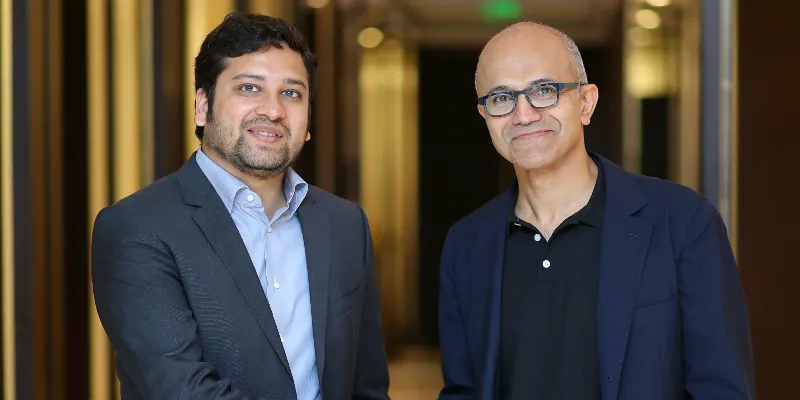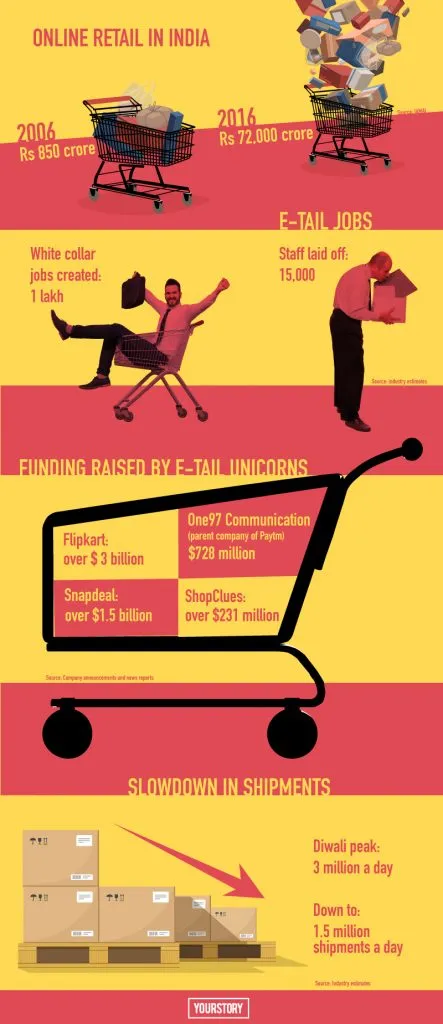Will Flipkart’s funding lead to April showers for Indian startups?
The e-commerce leader's latest round of funding matters to startups not just in terms of further investment inflow.

On 12 April, Zestmoney Co-founder and CEO Lizzie Chapman ran into Flipkart Co-founder and Group CEO Binny Bansal on a flight to Barcelona, just two days after Flipkart announced raising $1.4 billion from the likes of Tencent, eBay, and Microsoft.
“I said to Binny, THANK YOU for saving the startup industry in India. We are all relieved. All the global investors we spoke to last year were like ‘oh e-comm [sic] in India is dead’. No way is it dead!” Lizzie told YourStory over WhatsApp.
Being the poster boy of the Indian startup ecosystem, Flipkart’s success and failures have an impact. The news of their latest round of funding has brought about excitement for startups. “The round demonstrates the confidence restoration of foreign investors in the Indian startup story,” says Varun Khurana, Co-founder of agri-focused supply chain startup Crofarm.
There is surely hope for more investment inflows; many are also expecting the second revolution in e-commerce, with focus on profitability, along with more consolidation.
After the second half of 2016, many funded startups have had massive layoffs, down-scaling, and the shutting of operations. Subsequently, the media started painting a gloomy picture for the ecosystem, regularly putting forth forecasts of doom for startups. But it looks like the beginning of spring now.
Icebreaker for investors
Six startup founders with whom YourStory spoke to said they have been asked by investors to wait till the return of heavyweight investors like Tiger Global, Softbank, Tencent et al. Startups who were seeking Series A and B investments have been told to wait and watch till curtain rises on funding for the heavyweights, including Flipkart and Snapdeal.
Says the founder of a logistics startup on condition of anonymity: “I have been talking to multiple VCs for Series A financing for over three months. Most of these conversations have revolved around the prospect of a next round in Flipkart.” Now, after Flipkart’s mega round, he sees more chances of closing investment for his two-year-old startup.
Data also validates the concern of Series A and B investors last year. Seed funded startups are finding it hard to break the Series A bottleneck. According to YourStory’s data, during 2016, only 45 Series A deals were materialised, while Series B investments slowed down too, with only 29 deals.
In stark contrast, in 2015, things were flourishing, with about 81 Series A and 64 Series B deals getting closed. “More Series A and B deals materialised because of participation of heavyweight investors in Flipkart, Snapdeal, Oyo, and Grofers,” says the founder of a large last-mile transportation company, on condition of anonymity. The Gurgaon-based company has been trying to raise a Series B round for six-eight months now. Apparently, a couple of investors whom they had approached earlier are now interested in meeting – after news of the Flipkart funding.
Arjun Zacharia, Wooplr Co-founder and CEO, says, “Investors have been asking about the Flipkart situation, as the company has had a lot of negative PR. There was negative sentiment among investors even for smaller/early-stage startups. After all, the bell ringer of Indian e-commerce being in trouble is a cause of concern for them – they would be worried about whether their investment was safe.” Arjun believes that that question will stop now, and it will help push smaller cheques in pre-Series A.
Flipkart is the benchmark for the startup ecosystem in the country, from an investment perspective. Ankur Warikoo, Founder and CEO, Nearbuy, says, “No one denies that India is a long term story. What people are jittery about is whether now is the right time to enter. Having Tencent, eBay, and Microsoft backing them up is definitely going to build a positive sentiment among investors,” he says.
Led by Tiger Global and Softbank, investors pumped in over $14 billion into Indian startups in 2015. However, funding activities turned tepid in 2016 as the aforementioned investors shied away from pumping capital into any startup.
Varun of Crofarm believes that, besides foreign investors, Flipkart’s funding will certainly drive the confidence of local investors as well. “A majority of early or mid-stage investors will get an exit only with the participation of offshore investors,” he adds. He points to the example of Softbank’s effort to offer exit to Kalaari and Nexus in Snapdeal.
Consolidation: Boom or doom?
While Flipkart raising funding from such huge investors is making so much news because of the large alliance now formed against Amazon, the picture is much larger than the battle between the two. Industry observers are expecting more consolidation in the e-commerce industry.
Rahul Khanna, Managing Partner at Trifecta Capital, says, “This is not just about Amazon and Flipkart – there is a long chain of companies providing services like logistics. They rely on Flipkart to grow and sustain.” Calling Flipkart’s funding a positive development, he says that if Flipkart acquires Snapdeal, it will create one more consolidation event. Rahul adds:
“It will benefit the acquired companies and give them a chance to grow. Some M&A is needed to ensure that smaller companies find a home and provide jobs, as opposed to companies being wound out.”
According to Sanjay Nath, Founder Partner at Blume Ventures, consolidation happens because there is too much uncertainty for too long. “With Flipkart, Paytm, Amazon, and ShopClues around, India does not need more horizontal players. Consolidation should happen for a differentiated database. Tech has to be more differentiated. Innovation should go into backend as well: logistics, community, content, payments, robotics, and supply chain for more geographic expansion.”

E-commerce is born again?
There are voices crying out that Flipkart’s success should not be interlinked with rest of the ecosystem. Rahul Choudhry, Partner and Co-founder of Stellaris VC, says, “Flipkart funding is a sort of relief and a good sign; but it has nothing to do with the spirit of the startup community. I inherently believe that the success or failure of one company can’t determine the fate of a large market like India.”
The impact of this funding in e-commerce, however, will be huge. Niche players will emerge in e-commerce now, says Lizzie, as will businesses like ZestMoney – companies that actually make e-commerce profitable. Ankur of Nearbuy also believes that more players will emerge in e-commerce. “There may not be an impact on vertical or horizontal per se. Investors have the confidence to back Flipkart; they will continue to fight. It is good for the ecosystem,” he says.
Comparison with Amazon is not entirely fair. As Rahul of Trifecta says, Amazon has a very different role to play in the US’ entire retail ecosystem. He specifies that given the large and diverse market in India, it takes more than one player to build the opportunity “Categories like books and electronics will get more players now. For durables, grocery, home, and furniture, the e-commerce channel has just started,” he adds.
Profitability to be the focus
The euphoria around the fund raise by Flipkart does not, however, blind anyone to reality. “Undoubtedly, this is reassuring for the ecosystem; however, the question still remains about the sustainability of e-commerce players,” says Santosh Desai, MD of Futurebrands. According to him, in the long run, these businesses need to show profitability.
Sanjay Nath of Blume Ventures agrees. “Keeping valuations and vanity metrics aside, the criticism is about the lack of outcome in e-commerce in India. There is a need for players in niche verticals, good inventory, and a push for profitability,” he says.

Flipkart getting $1.4 billion does not mean that it is now easier for others to raise funding too. But it does show that there is a lot of money in the ecosystem available to be deployed. Kashyap Deorah, a veteran tech entrepreneur and Co-founder of Hypertrack, cautions startups to focus on the fundamental of business.
Unlike 2014-15 (referred to as the hyper investing period in startups), investors will look for solid business with the component of profitability. “Flipkart’s latest funding won’t drive investors to fall prey to vanity metrics [like GMV, GTV, DAU et al.],” he adds.
“I see this round as acqui-financing. The Indian e-commerce sector has become a proxy war zone for foreign funds. The participation of eBay, Tencent, and Microsoft in the latest round signifies the emergence of a third front (besides Amazon and Alibaba) in the Indian e-commerce war,” he explains.
It all depends on how well you build your business. Swati Bhargava, Co-founder of Cashkaro, says, “More investors want to invest in India. But you have to show them the focus on market share or a profitability-centric approach. You need to ensure good numbers for future fundraising too.” She says that startups are now more cognizant of unit metrics and profitability than in the past, when they only chased GMV.
The game is now about striking a balance between market share and good unit economics. It will help build more sustainable businesses. Cash burn needs to be a thing of past in e-commerce now. Spending money wisely and wanting to make a profit in two or three years shows that the system is maturing too.







